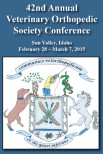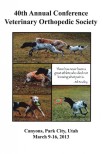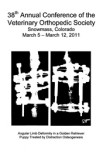Objective: To report indications, complications, and long-term outcomes following feline total hip replacement (THR) using a client-based clinical metrology questionnaire, the Feline Musculoskeletal Pain Index (FMPI), and owner satisfaction.
Study design: Multi-institutional retrospective cohort study.
Animals: Cats (n = 44) that underwent THR (n = 56).
Methods: Feline THRs submitted to a registry over a 10-year period were reviewed. The FMPI and owner satisfaction surveys were used to assess outcome.
Results: Forty-four cats met the inclusion criteria. Median age was 2 years (range: 0.9-11), and median bodyweight 5 kg (range: 3.3-7.6). British Shorthair and Domestic Shorthair were the most frequent breeds. Most cats were neutered males (33/44) and slipped capital femoral epiphysis (SCFE) was the most common surgical indication (34/56). All implants were cemented micro and nano hip implants. Overall complications (11/56) included 9 major complications. The median duration of follow up was 752 days (range: 102-3089). No association was found between clinical variables and complications. The FMPI score improved from 0.111 (range: 0-1.222) to 2.111 (range: 0.888-3.666) postoperatively (P < .001). Owner satisfaction was reported as "very good" in 30/33 cases (90.9%).
Conclusion: A validated client metrology questionnaire showed clinical improvement in cats following THR. The most common indication for THR in cats was SCFE occurring in young male neutered cats. Complication rates were comparable to previous reports.
Clinical significance: Total hip replacement appears to be a successful surgical treatment for feline hip disease with very good owner satisfaction and acceptable complication rates.









